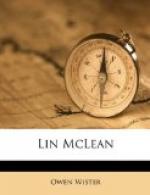The cow-puncher stopped dead short, and his hand slid off his brother’s shoulder. “You’ve made it plain,” he said, evenly, slanting his steady eyes down into Frank’s. “You’ve explained yourself fairly well. Run along with your crowd, and I’ll not bother yu’ more with comin’ round and causin’ yu’ to feel ashamed. It’s a heap better to understand these things at once, and save making a fool of yourself any longer ‘n yu’ need to. I guess there ain’t no more to be said, only one thing. If yu’ see me around on the street, don’t yu’ try any talk, for I’d be liable to close your jaw up, and maybe yu’d have more of a job explainin’ that to your crowd than you’ve had makin’ me see what kind of a man I’ve got for a brother.”
Frank found himself standing alone before any reply to these sentences had occurred to him. He walked slowly to his club, where a friend joked him on his glumness.
Lin made a sore failure of amusing himself that night; and in the bright, hot morning he got into the train for Swampscott. At the graveyard he saw a woman lay a bunch of flowers on a mound and kneel, weeping.
“There ain’t nobody to do that for this one,” thought the cow-puncher, and looked down at the grave he had come to see, then absently gazed at the woman.
She had stolen away from her daily life to come here where her grief was shrined, and now her heart found it hard to bid the lonely place goodbye. So she lingered long, her thoughts sunk deep in the motionless past. When she at last looked up, she saw the tall, strange man re-enter from the street among the tombs, and deposit on one of them an ungainly lump of flowers. They were what Lin had been able hastily to buy in Swampscott. He spread them gently as he had noticed the woman do, but her act of kneeling he did not imitate. He went away quickly. For some hours he hung about the little town, aimlessly loitering, watching the salt water where he used to swim.
“Yu’ don’t belong any more, Lin,” he miserably said at length, and took his way to Boston.
The next morning, determined to see the sights, he was in New York, and drifted about to all places night and day, till his money was mostly gone, and nothing to show for it but a somewhat pleasure-beaten face and a deep hatred of the crowded, scrambling East. So he suddenly bought a ticket for Green River, Wyoming, and escaped from the city that seemed to numb his good humor.
When, after three days, the Missouri lay behind him and his holiday, he stretched his legs and took heart to see out of the window the signs of approaching desolation. And when on the fourth day civilization was utterly emptied out of the world, he saw a bunch of cattle, and, galloping among them, his spurred and booted kindred. And his manner took on that alertness a horse shows on turning into the home road. As the stage took him toward Washakie, old friends turned up every fifty miles or so, shambling out of a cabin or a stable, and saying, in casual tones, “Hello, Lin, where’ve you been at?”




